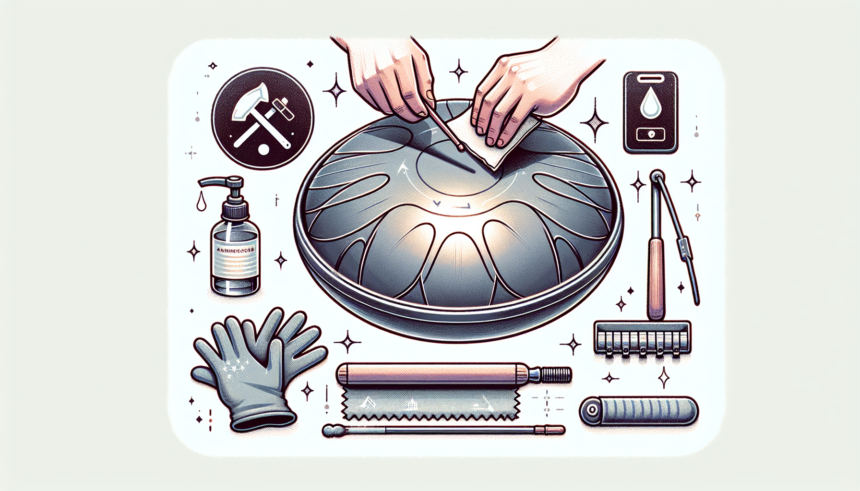The handpan is a captivating and unique musical instrument that produces enchanting sounds with its steel body. However, this steel body is susceptible to rust if not properly cared for. Rust can detract from both the instrument’s appearance and its functionality. Therefore, knowing how to prevent and treat rust effectively is crucial for any handpan owner.
Understanding Rust
Rust, scientifically known as iron oxide, forms when iron or its alloys (such as steel) react with oxygen and moisture. This chemical reaction results in corrosion which can weaken the structure of your handpan over time. To understand how to prevent and treat rust, it is essential to recognize that rust forms more readily in environments with higher humidity and salt levels.
Preventing Rust on Your Handpan
1. Proper Storage
Ensuring your handpan is stored in a suitable environment is the first step in rust prevention. Store your handpan in a dry place. Moisture is the enemy when it comes to steel instruments, hence avoid damp basements or garages. A climate-controlled room with a dehumidifier can be a good solution to prevent excessive moisture. Additionally, using a hard case with silica gel packs can help absorb any moisture present around the instrument.
2. Regular Cleaning
Regular cleaning of your handpan is vital. After every use, wipe the instrument down with a dry, lint-free cloth to remove any sweat, fingerprints, or dirt that might attract moisture and lead to rust. It’s advisable to use a microfiber cloth specifically designed for cleaning musical instruments as these are non-abrasive and effective at removing contaminants without scratching the surface.
3. Applying Protective Oils
Applying protective oils specifically designed for handpans creates a barrier against moisture. Some common oils used are Phoenix Oil, FrogLube, and coconut oil. To apply, put a small amount of oil on a lint-free cloth and rub it thoroughly over the entire surface of the handpan. Repeat this process every few weeks or whenever you notice that the handpan starts to look dry. However, it’s crucial to avoid using oils that might become sticky or attract dirt over time.
4. Avoiding Harsh Environments
Where you play your handpan also matters. Avoid playing the handpan in places where it is likely to get wet or where the environment is highly humid. Beachside playing might be great for aesthetics but can expose your instrument to salt, causing faster rusting. If you must play in such environments, ensure you clean and apply protective oil immediately after use.
5. Protective Coverings
Using protective covers when transporting or storing your handpan provides an additional layer of defense against elements that might cause rust. Make sure that the cover is breathable to prevent moisture from being trapped inside but sturdy enough to provide physical protection.
Treating Rust on Your Handpan
1. Early Detection
Early detection of rust is key to preventing it from spreading. Regularly inspect your handpan for any signs of rust. Small rust spots are easier to treat than larger, more developed ones. If caught early, a small rust spot can be treated with minimal effort and won’t affect the instrument’s sound quality.
2. Using Rust Removers
If you find rust spots on your handpan, use a rust remover to treat them. Products like Evapo-Rust or WD-40 Specialist Rust Remover work well for this purpose. Apply a small amount of the rust remover to a cloth and gently rub the rusted area until the rust is removed. It’s important to not be too abrasive as this might damage the surface of the handpan.
3. Sanding the Rust
In cases where the rust is more significant, light sanding might be necessary. Use fine-grit sandpaper, around 600-grit, and sand the affected area gently. Be cautious and gentle during this process as you do not want to create uneven spots on your handpan. After sanding, clean the area thoroughly with a dry cloth and reapply a protective oil to prevent future rusting.
4. Repainting or Recoating
If the rust has significantly damaged a larger area, you might need to consider repainting or recoating your handpan. This process should ideally be done by a professional to ensure that it does not affect the handpan’s sound quality. Recoating can provide a new protective layer that helps prevent future rust.
5. Professional Maintenance
If you are unsure about treating the rust yourself or if the rust damage is extensive, it is advisable to seek professional help. Handpan makers and specialized repair technicians have the expertise and tools to restore your handpan effectively. Regular professional maintenance can prolong the life of your instrument and ensure it stays in optimal condition.
Conclusion
Proper care and maintenance are essential for preventing and treating rust on your handpan. By storing your handpan correctly, cleaning it regularly, applying protective oils, avoiding harsh environments, and using protective covers, you can effectively prevent rust formation. Early detection and treatment of rust spots using rust removers or light sanding can stop rust from spreading and preserve the instrument’s functionality and aesthetic appeal. For significant rust damage, professional maintenance is recommended to restore the handpan without compromising its sound quality. By following these guidelines, you can ensure that your handpan remains in excellent condition and continues to produce its beautiful sound for years to come.
FAQs
1. How often should I oil my handpan?
It’s recommended to oil your handpan every few weeks or whenever it starts to look dry. Regular oiling creates a protective barrier against moisture and helps prevent rust formation.
2. Can I use any type of oil on my handpan?
No, it’s best to use oils specifically designed for handpans, such as Phoenix Oil, FrogLube, or coconut oil. Avoid using oils that might become sticky or attract dirt over time.
3. What should I do if my handpan gets wet?
If your handpan gets wet, immediately dry it off with a lint-free cloth. Ensure that the instrument is completely dry before placing it back in its case or storage place. Applying a protective oil after drying can also help prevent rust.
4. Can I store my handpan in the basement?
Basements are typically damp and might have higher humidity levels, which can accelerate rust formation. It is better to store your handpan in a dry, climate-controlled room. Using a dehumidifier can assist in maintaining the optimal environment.
5. How can I detect rust early?
Inspect your handpan regularly for any signs of rust. Early detection can involve looking for small, discolored spots or rough patches on the surface. Treating rust early is less labor-intensive and helps maintain the instrument’s condition.





